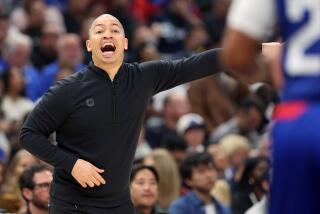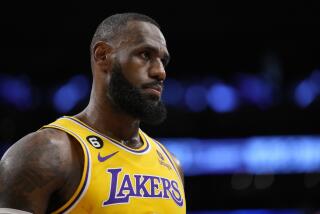The NBA : Coaching Warriors: Job That Few Want
- Share via
Even though the season is only about half gone, it may already be over for the Golden State Warriors.
In a league in which teams don’t have to do much to get into the playoffs, the Warriors haven’t managed to do anything except lose 26 of 33 games since Dec. 1.
The Warriors are 15-37 overall, 2-25 on the road, and in danger of sinking completely out of sight before March. That is bad news for them because the playoffs don’t start until April.
As you might expect in dealing with this type of trauma, there’s even a little controversy to get your hands dirty.
John Bach is the Warriors’ coach--until the end of the season. We know this because club owner Franklin Mieuli said so last week when he took the unusual step of issuing a press release that was intended to clear things up, but instead made Bach look even shakier.
“John Bach will be the head coach of the Golden State Warriors until the end of the 1985-86 season,” Mieuli said in the statement.
At least he’s bargain basement. The second-lowest paid coach in the NBA, Bach makes $94,000. His record in two-plus seasons with the Warriors is 74-142, a .343 percentage, also basement material.
Bach no doubt finds his job security wonderfully helpful in trying to get his players to play for him when they know the real reason he’s still coaching them is that the Warriors couldn’t find anybody else.
It started a month ago, after all the early season euphoria produced by the contract signings of Purvis Short and Chris Mullin had disappeared. The Warriors were 2-14 in January, and Mieuli was becoming increasingly concerned.
The reason was money. Mieuli wanted the club to look good because Jim Fitzgerald, former owner of the Milwaukee Bucks, has an option to buy the team at the end of the year. A better record means a bigger check.
Since he couldn’t fire the players, Mieuli started with the next-best thing.
He decided to fire the coach, or at least see if anybody else wanted Bach’s job.
Paul Silas asked about it, but when he learned that the job would cover only the rest of the season, the former Clipper coach backed out.
Mieuli asked Alvin Attles, who coached the Warriors for 13 years, to take over the club from Bach, Attles’ former assistant coach. But Attles, now the Warriors’ general manager, refused.
Where to turn next? The Warriors reportedly approached one of their former players, Butch Beard, but that didn’t work out. Phil Jackson, a former Knick and now a coach in the Continental Basketball Assn., called the Warriors, but it is not known whether they called him back.
So that’s where it stands with the Warriors: a losing team with a lame-duck coach whose job depends entirely on players who apparently sense it’s nearly time to throw in the towel.
“It looks like they’ve given up on the season,” Short said.
Sixteen-year NBA veteran Elvin Hayes, who threw his hat into the coaching ring at the University of Houston and then picked it up, is throwing it back in again.
Hayes, 40, has decided he really wants to replace Guy Lewis as Houston’s basketball coach after all.
Lewis, 64, is retiring at the end of this season. Lamar Coach Pat Foster is believed to have the inside track, but that was before Hayes re-entered the race.
“I think I would be able to recruit some players,” Hayes said. “The school needs someone with a lot of exposure who has been in the public eye. I also feel strongly about graduating kids from a college program.”
Tom Ford, Houston’s athletic director, said he preferred that the next coach have at least three years of head coaching experience at a Division I school, which Foster does and Hayes, who has never coached on any level, does not.
What a difference some pay makes.
On Feb. 1, Patrick Ewing was paid to make an appearance at a sporting goods store in Beverly Hills, where he signed autographs for anyone who wanted one.
Sunday, standing in a boarding lounge at the Dallas-Fort Worth airport after the All-Star game, Ewing refused every person who sought a free autograph from him.
When U.S. District Judge Robert Carter ruled recently that the Knicks’ offer sheet to free agent Albert King had violated the league’s salary cap arrangement, you can bet the Clippers took notice.
King’s offer sheet, which was matched by the New Jersey Nets, is structured much the same way as Norm Nixon’s contract.
As the Knicks did for King, the Seattle SuperSonics wrote Nixon an offer sheet that included a loan in the first year and a signing bonus in the second year, both of them spread over the length of the contract and, in theory, therefore not counted against the yearly team salary limitations.
The last two years of Nixon’s contract, believed to be for $900,000 annually, cover a period when the league’s union agreement and the salary cap rules will have expired.
Many teams over the cap have resorted to drawing more creative offer sheets to get around it. But Carter, the special master who rules on league matters, may have ended the writing of such contracts.
Larry Fleisher, chief counsel of the NBA players union, said that the union will appeal Carter’s finding.
Meanwhile, the Clippers aren’t sure how Carter’s ruling on King affects their contract with Nixon.
“I was surprised when I heard about it,” General Manager Carl Scheer said. “I don’t know if we have any recourse from a legal standpoint.”
But Fleisher said he expects the Clippers to take action.
“I don’t see any way the Clippers can win this thing, but I do know they’ll try,” Fleisher said. “That’s one thing I’m sure of.”
According to a source familiar with Nixon’s offer sheet, the Clippers sought a waiver that would enable them to recover a portion of Nixon’s salary, based on Carter’s eventual decision on King’s offer sheet. The Clippers were refused.
The ruling on King was made after an appeal by the Nets, in partnership with the league. Scheer said he does not expect help from the NBA if the Clippers seek a similar appeal of Nixon’s offer sheet.
“We asked the league before if they would participate,” Scheer said. “The league did not feel they could. They may have implied we could press it ourselves.”
More to Read
Go beyond the scoreboard
Get the latest on L.A.'s teams in the daily Sports Report newsletter.
You may occasionally receive promotional content from the Los Angeles Times.










